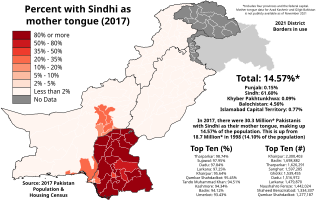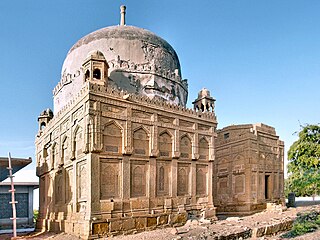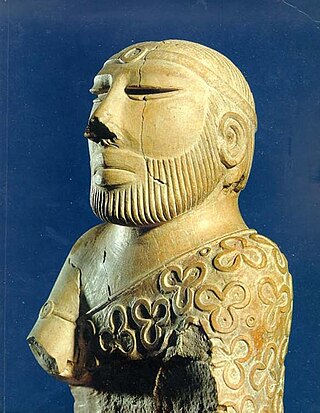Related Research Articles

Karachi is the capital city of the Pakistani province of Sindh. It is the largest city in Pakistan and the 12th largest in the world, with a population of over 20 million. It is situated at the southern tip of the country along the Arabian Sea coast and formerly served as the capital of Pakistan. Ranked as a beta-global city, it is Pakistan's premier industrial and financial centre, with an estimated GDP of over $200 billion (PPP) as of 2021. Karachi is considered Pakistan's most cosmopolitan city, and among the country's most linguistically, ethnically-, and religiously-diverse regions, as well as one of the country's most progressive and socially liberal cities.

Sindh is a province of Pakistan. Located in the southeastern region of the country, Sindh is the third-largest province of Pakistan by land area and the second-largest province by population after Punjab. It is bordered by the Pakistani provinces of Balochistan to the west and north-west and Punjab to the north. It shares an International border with the Indian states of Gujarat and Rajasthan to the east; it is also bounded by the Arabian Sea to the south. Sindh's landscape consists mostly of alluvial plains flanking the Indus River, the Thar Desert of Sindh in the eastern portion of the province along the international border with India, and the Kirthar Mountains in the western portion of the province.

Hyderabad is a city and the capital of Hyderabad Division in the Sindh province of Pakistan. It is the second-largest city in Sindh, and the fifth largest in Pakistan.

Sindhi is an Indo-Aryan language spoken by about 30 million people in the Pakistani province of Sindh, where it has official status. It is also spoken by a further 1.7 million people in India, where it is a scheduled language, without any state-level official status. The main writing system is the Perso-Arabic script, which accounts for the majority of the Sindhi literature and is the only one currently used in Pakistan. In India, both the Perso-Arabic script and Devanagari are used.

Sindhis are an Indo-Aryan ethnolinguistic group who speak the Sindhi language and are native to the Sindh province of Pakistan. The historical homeland of Sindhis is bordered by the southeastern part of Balochistan, the Bahawalpur region of Punjab and the Kutch region of Gujarat. Having been isolated throughout history, unlike its neighbours, Sindhi culture has preserved its own uniqueness.

Sukkur is a city in the Pakistani province of Sindh along the western bank of the Indus River, directly across from the historic city of Rohri. Sukkur is the third largest city in Sindh after Karachi and Hyderabad, and 14th largest city of Pakistan by population. The city was originally founded by the Rai dynasty of Sindh. The modern city was built in the 1840s. New Sukkur was established during the British era alongside the village of Sukkur. Sukkur's hill, along with the hill on the river island of Bukkur, form what is sometimes considered the "Gate of Sindh".

Mirpur Khas is the capital city of the Mirpur Khas District and Mirpur Khas Division in the Sindh province, Pakistan. Mirpur Khas is the 6th largest city in Sindh province and the 34th largest city of Pakistan. The city was built by Talpur rulers of Mankani branch. According to the 2017 Census of Pakistan, its population is 233,916. Mirpur Khas is known for its mango cultivation, with hundreds of varieties of the fruit produced each year - it is also called the “City of Mangoes,” and has been home to an annual mango festival since 1955. After the completion of Hyderabad-Mirpurkhas dual carriage way, the city has become hub of commercial activities.

Nawabshah is a tehsil and headquarters of the Shaheed Benazirabad District of Sindh province, Pakistan. This city is situated in the middle of Sindh province. It is the 27th largest city in Pakistan. Nawabshah Tehsil was established in 1903 by the British government. The tehsil was a part of Hyderabad district. On 1 November 1912, Nawabshah was upgraded to a district status of Sind Division.
Tando Adam is a city in Sindh, Pakistan. It was formerly under Nawab Shah district until 1955 and later became part of Sanghar District. It is the 57th largest city in Pakistan, Tando Adam was founded by Mir Adam Khan Mari, which is called "cantonment" for "Tando" in Balochi. Tando Adam is known for its industries and its agriculture; crops raised nearby include sugar-cane, wheat, cotton, bananas, and mangoes. It is the most populous city of Sanghar District with a population of 152,025 according to the 2017 census.

The history of Sindh refers to the history of the Pakistani province of Sindh, as well as neighboring regions that periodically came under its sway.

The Sindhudesh Movement is a separatist movement, based in Sindh, Pakistan, seeking to create a homeland for Sindhis by establishing an ethnic state called Sindhudesh, which would be either autonomous within Pakistan or independent from it.
Sindhi literature is the collection of oral and written literature in the Sindhi language in prose and poetry. The Sindhi language of the province of Sindh in Pakistan is considered one of the oldest languages of ancient India, and influenced the language of Indus Valley inhabitants. Sindhi literature has developed over a thousand years.

Hemandas Kalani was a revolutionary during the Indian Independence Movement. He was a leader of Swaraj Sena, a student organisation which was affiliated with All India Students Federation (AISF). He was one of the youngest revolutionaries to be martyred for the nation's freedom struggle, being executed by the British colonial authorities when he was only 19, two months before his 20th birthday.
Nabi Bakhsh Khan Baloch was a Baloch research scholar, historian, sindhologist, educationist, linguist and writer. He predominantly wrote in Sindhi, but sometimes in Urdu, English, Persian and Arabic. He has been described as the "moving library" of the Pakistani province of Sindh.
Jamaluddin Abro, also known as Jamal Abro was a Sindhi writer. He was born in Sangi, a small village in Mehar Taluka, then part of Dadu District.

Institute of Sindhology is a resource for knowledge of the Sindh region in present-day Pakistan.

Ghulam Muhammad Mahar Medical College or GMMMC in short is the sixth public sector Medical college under the Government of Sindh where 100 students of Sukkur, Khairpur and Ghotki are getting education every year. It is named after Sindh politician Ghulam Muhammad Khan Mahar.
Noor Muhammad Lakhair was a Sindhi nationalist, educator, freedom fighter, social activist, and founder of Noor Muhammad High School and the Muslim Hostel in Hyderabad, Sindh.

Mian Sahib , Mian Jo Goth(Sindhi: ميان جو گوٺ) is the town of Shikarpur District in the Sindh Province of Pakistan, is a union council. It is located at 28°9'17"N 68°38'32"E at an altitude of 59 metres. Mian Sahib, is a historical village of Shikarpur District, although Mian Sahib is now a relatively small city, it borders with the nearest town Mubarakpur, Jacobabad town of Jacobabad District and it's also the largest town of the tehsil Khanpur, Sindh Of Shikarpur District.

The Sevakunj Hostel, a historic landmark in Aram Bagh Road, Rambagh Quarter, Karachi. The building was erected in the 1910s by an affluent Hindu family.
References
- ↑ "Pakistan Chowk: Restoring the glory of a neglected heritage site". The News International . Archived from the original on 6 May 2023. Retrieved 6 May 2023.
- ↑ "Pakistan Chowk — a sigh of relief in the concrete jungle". The Express Tribune . 11 December 2016. Archived from the original on 15 December 2016. Retrieved 6 May 2023.
- 1 2 3 4 5 6 7 8 9 10 11 12 "Old Town — Blog". Pakistan Chowk Community Centre. Archived from the original on 6 May 2023. Retrieved 6 May 2023.
- 1 2 3 Shujrah, Mahnaz. "The Changing Faces of Pakistan Chowk". Youlin Magazine. Archived from the original on 6 May 2023. Retrieved 6 May 2023.
- ↑ Rafi, Haneen (17 August 2017). "Pakistan Chowk Community Centre inaugurated". DAWN.COM. Archived from the original on 6 May 2023. Retrieved 6 May 2023.